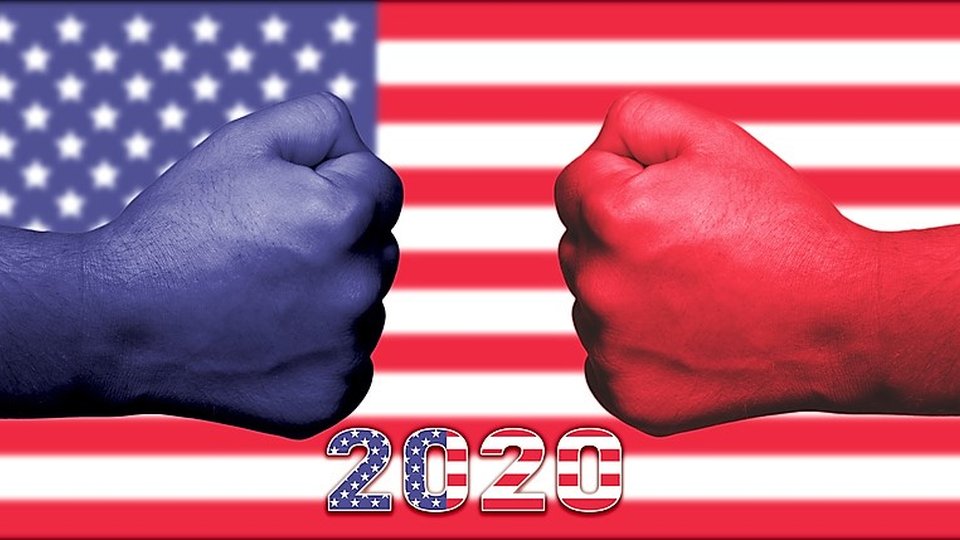Government
Trump or Biden? Veteran AAMA lobbyist calls it a wash
Which candidate will win the presidential election? The AAMA's lobbyist John Russell IV cites a number of factors that will influence a very tight race in a highly polarized nation.

September 23, 2020 by Elliot Maras — Editor, Kiosk Marketplace & Vending Times
Which presidential candidate — Donald Trump or Joe Biden — will be better for the amusement machine industry?
That question befuddles as experienced an observer as John Russell IV, a 13-year lobbyist for the American Amusement Machine Association. Russell, a principal of Dentons LLP US in Washington, D.C., offered his insights about the election in an interview with Vending Times following his presentation about the race in an AAMA webinar last week.
"I think it's a wash," Russell said.
"Clearly, former Vice President Biden's been around for a very, very, very long time," he said. "He is familiar with a host of issues be it banking to the issues we face today with (business) closings."
"The president has certainly committed to helping small businesses and certainly has a track record to prove that," he said.
Trump's immigration policy has hurt seasonal employers, Russell said, but his changes to the tax code could be seen as positive for employers.
To answer the question, one would have to look at how each candidate stands on tax, immigration, health care and other policies that affect small business.
"I don't think I could answer that question right now," Russell said when pressed for an answer. "There are a host of questions you'd need to dive into before you could come up with who's better for the industry. It would almost be the 'spread sheet of death,' but I think it would be pretty close."
Trump has not been bad for the industry, he said, but he can't say that Biden would either be bad.
Response to the pandemic
Response to the pandemic has been lacking at all levels of government, Russell said. Since it happened under Trump's watch, he bears responsibility. However, he isn't sure that Biden's response would have been better.
"There's a very interesting question whether or not the U.S. could impose a national (COVID response) standard," he said. "The U.S. is unique because we are in fact a republic. Our states are empowered here. Unfortunately, this was a perfect storm that played into one of the weaknesses of a republic. And that is, you get 50 separate responses."
Russell acknowledged, when asked, that Trump bears some responsibility for the coin shortage that has caused some problems for the industry. The U.S. Mint was not prepared for having to close its offices because of the pandemic, which caused the coin shortage.
"He is the CEO," he said. "With the CEO rests the blame."
Russell does not believe the problems with the stimulus legislation to assist business can be blamed on either the president or the Congress.
"I would argue that that reflects on both sides of the aisle, both to Congress and the administration, and neither have wrapped themselves in a cloak of glory in the last couple of weeks as they seek to find an agreement for a phase 4 package," he said.
Who will win?
 |
| John Russell IV. Image courtesy of AAMA. |
As for who he thinks will win, Russell said that if the election were held today, he expects Biden to win. However, he admitted that he made the same prediction in 2016.
Will 2020 bring a repeat of 2016? Russell reviewed the similarities and differences between 2016 and 2020.
"I believe Donald Trump did not win the 2016 election," he said. "I believe Hillary Clinton lost it," specifically because of her decisions not to visit rural Pennsylvania, Wisconsin and Michigan.
"They (the Democrats) didn't see the dramatic split between rural America and urban America," he said. "They counted on rural Democratic votes sticking with them. These significant rural populations felt they had been left behind by the 2008 Obama administration. These rural populations didn't believe Hillary Clinton shared their values."
As for 2020, however, "Joe Biden isn't Hillary Clinton," he said. "Can he appeal to these rural, white, non-college educated voters? That's really the question."
The battleground states
Russell thinks the battleground states will be Florida, Michigan, Minnesota, Pennsylvania, Wisconsin, Arizona, Georgia and North Carolina.
"What's true about all of these states is you do have significant rural populations," he said.
At the present time, Biden is currently beating Trump in all eight of these states according to the polls.
In four of these eight states, Biden currently surpasses Trump in the polls by higher margins than he beat Clinton.
In three of these states, Trump bested Clinton by higher margins than he is currently favored over Biden.
In one state, Minnesota, Biden leads Trump by 3 points where Clinton won the state by 1.5 points.
"The point of this slide is that Donald Trump did not win with a landslide," Russell said.
Trump will need to pick up more blue states than he can currently count on to win, he said.
5 key questions
The five key questions that will decide the outcome are:
- Has Trump expanded his base? Russell thinks he has not.
- Has the urban/rural divide increased since 2016? Russell thinks it has.
- What is more important, Trump's liability for the coronavirus versus his credit for his past and future performance with the economy?
- How does the "rule of law" compare in people's minds to the "fight for equality?" Do the recent riots play as a "rule of law" or "social justice" call?
- Are you better off today than four years ago?
The undecided voters
Given the tightness of the race, the outcome will largely be decided by the 13% of Americans presently undecided on who to vote for.
A Clear Politics average of polls indicates 70% of the people think the country is moving in the wrong direction while 25% see it moving in the right direction.
Russell called Trump's 43% approval rating, which he has had since his first two months in office, concerning, but not low enough to prevent him from winning.
"Is it tough? You better believe it," he said.
Coronavirus versus economy?
As for his handling of the coronavirus, 39.8% approve of Trump's performance while 58.4% disapprove.
As for handling the economy, Trump's approval rating surpasses that of his overall performance: 49.4% approve while 48.1% disapprove.
"The question becomes, is this a coronavirus election or is it an economics election?" he asked. Russell could not answer the question.
Candidates' images
In looking at the candidates' images, as of July, 2020, Trump had a 48% positive rating and a 46% negative rating among white voters.
"This is one of the bright spots for the president," he said, given that he won the 2016 election on support from white voters without college educations in the Upper Midwest.
Biden's 52% negative and 31% positive rating among white voters, by contrast, is concerning. "It's in and around the numbers Hillary Clinton had," he said.
Voter enthusiasm
Still another factor is the enthusiasm level voters have for the candidates they are supporting. In this area, Trump has the edge.
Among those supporting Biden, 48% support him because they don't want Trump while 36% support him more for his own merits. "You've got more people voting for Biden just not to be (for) Trump. Clearly the campaign is about President Trump," he said.
Among those voting for Trump, 74% do so based on his merits versus 20% who support him because they don't want Biden. "The Republican camp is solidly behind Trump, in numbers like you have not seen before since Reagan's re-election in '84," Russell said.
"He (Trump) has to turn out his supporters," he said.
In comparing support for the candidates today compared to 2016, Trump's support at 44% is higher than the 41% he had at this time in 2016, while Biden's 52% support is above Clinton's 46% in 2016.
Another factor that could influence the outcome is enthusiasm for voting out incumbents. But exactly how this will affect the outcome is uncertain, as it will impact both sides.
What about Congress?
Eight House incumbents have lost seats so far this year, the most in a year without redistricting in decades, he said. "This is historic," he said. Members of both parties have lost seats for a variety of reasons.
"I think the increased interest this year in the election has found its way into the primary," he said.
One member who lost, Dan Lipinksi, served a suburban district of Chicago, Illinois, the last "pro-life" Democrat, losing to a progressive Democrat, Marie Newman.
"These members either got beaten by a progressive or had their own (legal) issues…that were enough for the base to turn them away," he said. "Those bases in those districts wanted a new member."
"It could be a foretelling of a 'throw the bums out,'" he said.
Russell said he expects the Democrats to hold on to their majority in the House of Representatives. There are currently 232 Democrats and 198 Republicans.
Looking at the Senate, Democrats don't have far to go to win the majority — three seats if they win the presidency and four seats if they lose it.
He said there are six "toss up" Senate races: Montana, Colorado, Iowa, Georgia, North Carolina and Maine.
High voter interest
The impact of high voter turnout is another unknown that could affect the outcome. More people will be mailed ballots than in previous elections, which will boost overall voter turnout. The level of interest in the election is unusually high.
The percentage of people who were thinking about the election in July was 77%, more than in any of the previous four presidential elections.
"That (77%) is an historic number," he said, not touched since 2004 (when 73% were thinking about it) when the Iraq invasion was being debated.
If the election were held today, Russell said Biden would win and the Democrats would take control of the Senate. He based this mostly on the question, are you better off today than four years ago?
A polarized nation
"We as Americans, politically speaking, have never been more polarized before," he said.
Polarization is not new, Russell said. In the last four years, however, the camps have hardened. Data from the Census Bureau indicates people are moving to areas that politically align with their own beliefs.
"The less intermingling between the two camps, the worse off we are as Americans," he said. He urged people to not let other people's politics get in the way of building personal friendships with them.
"At the end of the day, we are not Republicans or Democrats. We are in fact Americans."
Russell encouraged everyone to vote.
About Elliot Maras
Elliot Maras is the editor of Kiosk Marketplace and Vending Times. He brings three decades covering unattended retail and commercial foodservice.










